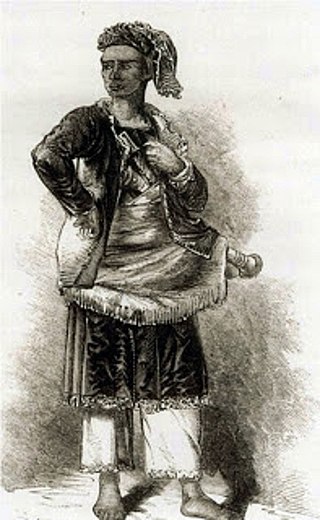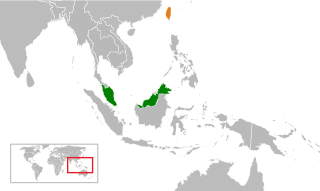 | |
Austria | Malaysia |
|---|---|

Bilateral foreign relations exist between Austria and Malaysia. Austria has an embassy in Kuala Lumpur, [1] and Malaysia has an embassy in Vienna. [2]
 | |
Austria | Malaysia |
|---|---|

Bilateral foreign relations exist between Austria and Malaysia. Austria has an embassy in Kuala Lumpur, [1] and Malaysia has an embassy in Vienna. [2]
History of relations between the two countries can be traced back in 1866 during the Austrian Empire period when the Emperor of Franz Joseph approved the opening of an imperial-royal Honorary Consulate in Penang. [3] However, when the Great Britain declared a war against the Austro-Hungarian Empire in August 1914, the Austrian Consulate was closed down and the last Austrian consul in Penang was detained and deported to Australia by the British administration. [3]
Another related history is located on the island of Borneo when the Austrian-German Consul in Hong Kong named Baron von Overbeck received a parcel of territory in the western coast of northern Borneo after being promoted by an American merchant named Joseph William Torrey in Hong Kong. von Overbeck then depart to Brunei to renewed the concession from the Temenggong of Brunei, [4] and a similar treaty from the Sultanate of Sulu on 22 January 1878. [5] To finance his plans for the territory, von Overbeck got financial backing from the Dent brothers (Alfred and Edward). However, after a high effort to promote the territory to the Austrian and German governments, he was unable to get any attention from the two to conquer the territory. Overbeck later withdrew in 1879, leaving it to Alfred Dent to manage the territory.
The Austrian make a first formal diplomatic relations on 6 August 1962. In 1967, Austria established its Honorary Consulate in Kuala Lumpur and between 1973 and 1974, both the Austrian Embassy in Kuala Lumpur and Malaysian Embassy in Vienna were opened. [3] [6]
In 2005, Malaysia and Singapore were the main trade partner for Austria, with Malaysia becoming Austria's most important partner in Southeast Asia. [7] Austria's main investment in Malaysia lies mostly in the energy and natural resources sectors. [7] In 2009, the financial crisis had an impact to the trade relations with a decrease by 30% but later improved after the visit of the Austrian President Heinz Fischer in 2011. [3] Since 1976, several agreements have been signed between the two countries. [8]

Malaysia is an active member of various international organisations, including the Commonwealth of Nations, the United Nations, the Organisation of Islamic Cooperation, and the Non-Aligned Movement. It has also in recent times been an active proponent of regional co-operation.

The North Borneo dispute, also known as the Sabah dispute, is the territorial dispute between Malaysia and the Philippines over much of the eastern part of the state of Sabah. Sabah was previously known as North Borneo prior to the formation of the Malaysian federation.

Abdul Momin was the 24th Sultan of Brunei from 1852 until his death in 1885.
The Philippines has claimed many territories throughout its history. These territories include the Spratly Islands, portions of North Borneo, and the Scarborough Shoal.

Germany–Malaysia relations are the foreign relations between Germany and Malaysia. Germany has an embassy in Kuala Lumpur, and Malaysia has an embassy in Berlin.

France–Malaysia relations are the foreign relations between France and Malaysia. France has an embassy in Kuala Lumpur, and Malaysia has an embassy in Paris.

Malaysia–Sweden relations refers to foreign relations between Malaysia and Sweden. Sweden has an embassy in Kuala Lumpur, and Malaysia has an embassy in Stockholm. As of 2009, 90 Swedish companies are present in Malaysia and about 450 Swedish citizens live in Malaysia. The number of Swedish citizens visiting Malaysia in 2011 was 44,138.

Canada–Malaysia relations refers to bilateral foreign relations between the two countries, Canada and Malaysia. Canada has a high commission in Kuala Lumpur, and Malaysia has a high commission in Ottawa. Both countries are full members of the Commonwealth of Nations. Canada has a long history of close and friendly bilateral relations with Malaysia and was one of the first countries to recognise Malaysia's independence.

Foreign relations exist between Austria and Japan. Both countries established diplomatic relations in 1869, that lasted until severed in 1914 due to the First World War. Relations were reestablished following the war. Austria has an embassy in Tokyo and four honorary consulates: in Hiroshima, Nagoya, Osaka and Sapporo. Japan has an embassy in Vienna and an honorary consulate in Salzburg.

Diplomatic relations between Austria and Bulgaria were established in 1879. Austria has an embassy in Sofia and an honorary consulate in Burgas while Bulgaria has an embassy in Vienna and an honorary consulate in Salzburg.

Bilateral foreign relations exist between Austria and Israel.

The 1955 Austrian State Treaty ended the four-power occupation and recognized Austria as an independent and sovereign state. In October 1955, the Federal Assembly passed a constitutional law in which "Austria declares of her own free will her perpetual neutrality." The second section of this law stated that "in all future times Austria will not join any military alliances and will not permit the establishment of any foreign military bases on her territory." Since then, Austria has shaped its foreign policy on the basis of neutrality.

The history of Sabah can be traced back to about 23–30,000 years ago when evidence suggests the earliest human settlement in the region existed. The history is interwoven with the history of Brunei and the history of Malaysia, which Sabah was previously part of and is currently part of respectively. The earliest recorded history of Sabah being part of any organised civilisation began in the early 15th century during the thriving era of the Sultanate of Brunei. Prior to this, early inhabitants of the land lived in predominantly tribal societies, although such tribal societies had continued to exist until the 1900s. The eastern part of Sabah was ceded to the Sultan of Sulu by the Sultan of Brunei in 1658 for the former helping a victory over Brunei enemies, but many sources stated it had not been ceded at all. By the late 19th century, both territories previously owned by Sultan of Brunei and Sultan of Sulu was granted to British syndicate and later emerged as British North Borneo under the management of the North Borneo Chartered Company. Sabah became a protectorate of the United Kingdom in 1888 and subsequently became a Crown colony from 1946 until 1963, during which time it was known as Crown Colony of North Borneo. On 16 September 1963, Sabah merged with Malaya, Sarawak and Singapore to form Malaysia.

Greece–Malaysia relations are foreign relations between Greece and Malaysia. The Greek embassy in Jakarta, Indonesia is also accredited to Malaysia, while the Malaysian embassy in Bucharest, Romania, is also accredited to Greece. There is an Honorary Greek Consulate in Kuala Lumpur. Correspondingly, the Malaysian embassy in Bucharest, Romania is at the same time accredited to Greece and there is a Malaysian Honorary Consulate in Athens. The Honorary Consul is Dr. Savvas Tzanis. The former Yang di-Pertuan Agong and current Raja of Perlis, Tuanku Syed Sirajuddin visited Greece in August 2004 to attend the 2004 Athens Olympics.

Cuba–Malaysia relations refers to bilateral foreign relations between Cuba and Malaysia. Diplomatic relations were established on 6 February 1975, Cuba opened its embassy in Kuala Lumpur on 1997, while Malaysia opened its representation in Havana in February 2001. Both are the members of Group of 77, Non-Aligned Movement and United Nations.
Gustav Overbeck from 1867 von Overbeck, in 1873 Baron von Overbeck, in 1877 Maharaja of Sabah and Rajah of Gaya and Sandakan, was a German businessman, adventurer and diplomat.

Malaysia–Nepal relations refers to bilateral foreign relations between Malaysia and Nepal. Malaysia has an embassy in Kathmandu, and Nepal has an embassy in Kuala Lumpur.

Malaysia–Poland relations refers to bilateral foreign relations between Malaysia and Poland. Malaysia has an embassy in Warsaw, and Poland has an embassy in Kuala Lumpur and consulates in Kuching and George Town.

Malaysia–Taiwan relations refers to bilateral foreign relations between Malaysia and Republic of China (Taiwan). The economic and the cultural relations are still maintained with Malaysia has a trade centre office in Taipei, and Taiwan has an economic and cultural centre in Kuala Lumpur.